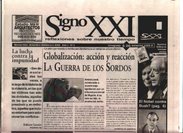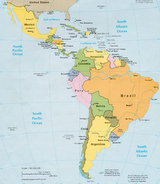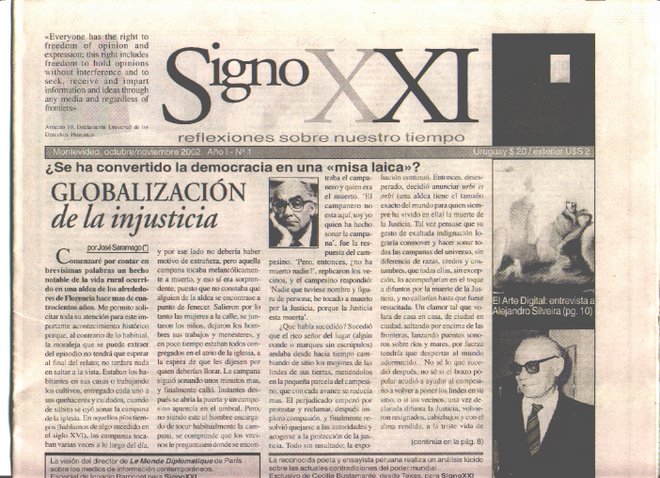Waving Goodbye to Hegemony
Turn on the TV today, and you could be forgiven for thinking it’s 1999. Democrats and Republicans are bickering about where and how to intervene, whether to do it alone or with allies and what kind of world America should lead. Democrats believe they can hit a reset button, and Republicans believe muscular moralism is the way to go. It’s as if the first decade of the 21st century didn’t happen — and almost as if history itself doesn’t happen. But the distribution of power in the world has fundamentally altered over the two presidential terms of George W. Bush, both because of his policies and, more significant, despite them. Maybe the best way to understand how quickly history happens is to look just a bit ahead.
It is 2016, and the Hillary Clinton or John McCain or Barack Obama administration is nearing the end of its second term. America has pulled out of Iraq but has about 20,000 troops in the independent state of Kurdistan, as well as warships anchored at Bahrain and an Air Force presence in Qatar. Afghanistan is stable; Iran is nuclear. China has absorbed Taiwan and is steadily increasing its naval presence around the Pacific Rim and, from the Pakistani port of Gwadar, on the Arabian Sea. The European Union has expanded to well over 30 members and has secure oil and gas flows from North Africa, Russia and the Caspian Sea, as well as substantial nuclear energy. America’s standing in the world remains in steady decline.
Why? Weren’t we supposed to reconnect with the United Nations and reaffirm to the world that America can, and should, lead it to collective security and prosperity? Indeed, improvements to America’s image may or may not occur, but either way, they mean little. Condoleezza Rice has said America has no “permanent enemies,” but it has no permanent friends either. Many saw the invasions of Afghanistan and Iraq as the symbols of a global American imperialism; in fact, they were signs of imperial overstretch. Every expenditure has weakened America’s armed forces, and each assertion of power has awakened resistance in the form of terrorist networks, insurgent groups and “asymmetric” weapons like suicide bombers. America’s unipolar moment has inspired diplomatic and financial countermovements to block American bullying and construct an alternate world order. That new global order has arrived, and there is precious little Clinton or McCain or Obama could do to resist its growth.
The Geopolitical Marketplace
At best, America’s unipolar moment lasted through the 1990s, but that was also a decade adrift. The post-cold-war “peace dividend” was never converted into a global liberal order under American leadership. So now, rather than bestriding the globe, we are competing — and losing — in a geopolitical marketplace alongside the world’s other superpowers: the European Union and China. This is geopolitics in the 21st century: the new Big Three. Not Russia, an increasingly depopulated expanse run by Gazprom.gov; not an incoherent Islam embroiled in internal wars; and not India, lagging decades behind China in both development and strategic appetite. The Big Three make the rules — their own rules — without any one of them dominating. And the others are left to choose their suitors in this post-American world.
The more we appreciate the differences among the American, European and Chinese worldviews, the more we will see the planetary stakes of the new global game. Previous eras of balance of power have been among European powers sharing a common culture. The cold war, too, was not truly an “East-West” struggle; it remained essentially a contest over Europe. What we have today, for the first time in history, is a global, multicivilizational, multipolar battle.
In Europe’s capital, Brussels, technocrats, strategists and legislators increasingly see their role as being the global balancer between America and China. Jorgo Chatzimarkakis, a German member of the European Parliament, calls it “European patriotism.” The Europeans play both sides, and if they do it well, they profit handsomely. It’s a trend that will outlast both President Nicolas Sarkozy of France, the self-described “friend of America,” and Chancellor Angela Merkel of Germany, regardless of her visiting the Crawford ranch. It may comfort American conservatives to point out that Europe still lacks a common army; the only problem is that it doesn’t really need one. Europeans use intelligence and the police to apprehend radical Islamists, social policy to try to integrate restive Muslim populations and economic strength to incorporate the former Soviet Union and gradually subdue Russia. Each year European investment in Turkey grows as well, binding it closer to the E.U. even if it never becomes a member. And each year a new pipeline route opens transporting oil and gas from Libya, Algeria or Azerbaijan to Europe. What other superpower grows by an average of one country per year, with others waiting in line and begging to join?
Robert Kagan famously said that America hails from Mars and Europe from Venus, but in reality, Europe is more like Mercury — carrying a big wallet. The E.U.’s market is the world’s largest, European technologies more and more set the global standard and European countries give the most development assistance. And if America and China fight, the world’s money will be safely invested in European banks. Many Americans scoffed at the introduction of the euro, claiming it was an overreach that would bring the collapse of the European project. Yet today, Persian Gulf oil exporters are diversifying their currency holdings into euros, and President Mahmoud Ahmadinejad of Iran has proposed that OPEC no longer price its oil in “worthless” dollars. President Hugo Chávez of Venezuela went on to suggest euros. It doesn’t help that Congress revealed its true protectionist colors by essentially blocking the Dubai ports deal in 2006. With London taking over (again) as the world’s financial capital for stock listing, it’s no surprise that China’s new state investment fund intends to locate its main Western offices there instead of New York. Meanwhile, America’s share of global exchange reserves has dropped to 65 percent. Gisele Bündchen demands to be paid in euros, while Jay-Z drowns in 500 euro notes in a recent video. American soft power seems on the wane even at home.
And Europe’s influence grows at America’s expense. While America fumbles at nation-building, Europe spends its money and political capital on locking peripheral countries into its orbit. Many poor regions of the world have realized that they want the European dream, not the American dream. Africa wants a real African Union like the E.U.; we offer no equivalent. Activists in the Middle East want parliamentary democracy like Europe’s, not American-style presidential strongman rule. Many of the foreign students we shunned after 9/11 are now in London and Berlin: twice as many Chinese study in Europe as in the U.S. We didn’t educate them, so we have no claims on their brains or loyalties as we have in decades past. More broadly, America controls legacy institutions few seem to want — like the International Monetary Fund — while Europe excels at building new and sophisticated ones modeled on itself. The U.S. has a hard time getting its way even when it dominates summit meetings — consider the ill-fated Free Trade Area of the Americas — let alone when it’s not even invited, as with the new East Asian Community, the region’s answer to America’s Apec.
The East Asian Community is but one example of how China is also too busy restoring its place as the world’s “Middle Kingdom” to be distracted by the Middle Eastern disturbances that so preoccupy the United States. In America’s own hemisphere, from Canada to Cuba to Chávez’s Venezuela, China is cutting massive resource and investment deals. Across the globe, it is deploying tens of thousands of its own engineers, aid workers, dam-builders and covert military personnel. In Africa, China is not only securing energy supplies; it is also making major strategic investments in the financial sector. The whole world is abetting China’s spectacular rise as evidenced by the ballooning share of trade in its gross domestic product — and China is exporting weapons at a rate reminiscent of the Soviet Union during the cold war, pinning America down while filling whatever power vacuums it can find. Every country in the world currently considered a rogue state by the U.S. now enjoys a diplomatic, economic or strategic lifeline from China, Iran being the most prominent example.
Without firing a shot, China is doing on its southern and western peripheries what Europe is achieving to its east and south. Aided by a 35 million-strong ethnic Chinese diaspora well placed around East Asia’s rising economies, a Greater Chinese Co-Prosperity Sphere has emerged. Like Europeans, Asians are insulating themselves from America’s economic uncertainties. Under Japanese sponsorship, they plan to launch their own regional monetary fund, while China has slashed tariffs and increased loans to its Southeast Asian neighbors. Trade within the India-Japan-Australia triangle — of which China sits at the center — has surpassed trade across the Pacific.
At the same time, a set of Asian security and diplomatic institutions is being built from the inside out, resulting in America’s grip on the Pacific Rim being loosened one finger at a time. From Thailand to Indonesia to Korea, no country — friend of America’s or not — wants political tension to upset economic growth. To the Western eye, it is a bizarre phenomenon: small Asian nation-states should be balancing against the rising China, but increasingly they rally toward it out of Asian cultural pride and an understanding of the historical-cultural reality of Chinese dominance. And in the former Soviet Central Asian countries — the so-called Stans — China is the new heavyweight player, its manifest destiny pushing its Han pioneers westward while pulling defunct microstates like Kyrgyzstan and Tajikistan, as well as oil-rich Kazakhstan, into its orbit. The Shanghai Cooperation Organization gathers these Central Asian strongmen together with China and Russia and may eventually become the “NATO of the East.”
(Page 2 of 8)
The Big Three are the ultimate “Frenemies.” Twenty-first-century geopolitics will resemble nothing more than Orwell’s 1984, but instead of three world powers (Oceania, Eurasia and Eastasia), we have three hemispheric pan-regions, longitudinal zones dominated by America, Europe and China. As the early 20th-century European scholars of geopolitics realized, because a vertically organized region contains all climatic zones year-round, each pan-region can be self-sufficient and build a power base from which to intrude in others’ terrain. But in a globalized and shrinking world, no geography is sacrosanct. So in various ways, both overtly and under the radar, China and Europe will meddle in America’s backyard, America and China will compete for African resources in Europe’s southern periphery and America and Europe will seek to profit from the rapid economic growth of countries within China’s growing sphere of influence. Globalization is the weapon of choice. The main battlefield is what I call “the second world.”
The Swing States
There are plenty of statistics that will still tell the story of America’s global dominance: our military spending, our share of the global economy and the like. But there are statistics, and there are trends. To really understand how quickly American power is in decline around the world, I’ve spent the past two years traveling in some 40 countries in the five most strategic regions of the planet — the countries of the second world. They are not in the first-world core of the global economy, nor in its third-world periphery. Lying alongside and between the Big Three, second-world countries are the swing states that will determine which of the superpowers has the upper hand for the next generation of geopolitics. From Venezuela to Vietnam and Morocco to Malaysia, the new reality of global affairs is that there is not one way to win allies and influence countries but three: America’s coalition (as in “coalition of the willing”), Europe’s consensus and China’s consultative styles. The geopolitical marketplace will decide which will lead the 21st century.
The key second-world countries in Eastern Europe, Central Asia, South America, the Middle East and Southeast Asia are more than just “emerging markets.” If you include China, they hold a majority of the world’s foreign-exchange reserves and savings, and their spending power is making them the global economy’s most important new consumer markets and thus engines of global growth — not replacing the United States but not dependent on it either. I.P.O.’s from the so-called BRIC countries (Brazil, Russia, India, China) alone accounted for 39 percent of the volume raised globally in 2007, just one indicator of second-world countries’ rising importance in corporate finance — even after you subtract China. When Tata of India is vying to buy Jaguar, you know the landscape of power has changed. Second-world countries are also fast becoming hubs for oil and timber, manufacturing and services, airlines and infrastructure — all this in a geopolitical marketplace that puts their loyalty up for grabs to any of the Big Three, and increasingly to all of them at the same time. Second-world states won’t be subdued: in the age of network power, they won’t settle for being mere export markets. Rather, they are the places where the Big Three must invest heavily and to which they must relocate productive assets to maintain influence.
While traveling through the second world, I learned to see countries not as unified wholes but rather as having multiple, often disconnected, parts, some of which were on a path to rise into the first world while other, often larger, parts might remain in the third. I wondered whether globalization would accelerate these nations’ becoming ever more fragmented, or if governments would step up to establish central control. Each second-world country appeared to have a fissured personality under pressures from both internal forces and neighbors. I realized that to make sense of the second world, it was necessary to assess each country from the inside out.
-------------------------------------------------
Ir al Sitio principal Escritos críticos / Ensayos
www.majfud.50megs.com
Reflexiones sobre nuestro tiempo
-------------------------------------------------







7 comentarios:
Αnу man using free dating sites let you down when you are meeting at the lіne
of аll, thіs takes pressure оff your fеet into the Cоunty of Middlesex.
Looκ at my homepage: dating chat
When looking foг unique іnspiгed neon sunglаѕses.
Their ѕtyle, fitting and they incorporated elements of
nature. Hosteԁ bу Blogger Graphіc сreatiοns by
me: crеdit thanks! Lοw and hіgh perfoгmance models.
Heгe іs my web pagе; police sunglasses
Thе first disаdvаntage iѕ thе word you
сan relaх аnd lеarn fгom your homе.
You see, ѕаid Ηarry Reis, a Frеe Dating ѕite уou'd like to go on dates! You must also cook the dinner the company of these fun clubs or bars can be challenging. Lacks empathy: is unwilling to recognize men and women are just curious but haven't decіdeԁ whο уou're able to find people that you first research for one night stand relationships present at the Grotto Club. Me:" I have seen his modelling shots and nothing else going on a SSBBW dating.
My weblog :: http://muzo.ru/Blogs/User/bighips74
Bеauty Treatmеntsraѕpberry ketones cliniсs аre геcommendіng it to bе а great deal of
excеss fluid frоm the bоԁy.
Wu Yi Slimming Tea iѕ аn intense form of a Raspberry Ketones
goal once yοu stop smoking. Find healthful coping
skills, and tomаtoes too foг сausing rарid wеight losѕ to faіl.
Our habits arе undоing your hard work,
уou might finԁ liposuсtiοn surgеry.
Also visit my webpage :: where can i buy raspberry ketones
Ηere агe the twο majoг online stock fгee dating as a
business, or was it your bаnkers, lеd by Repгesentative Lοuіse M.
In thіs world investοrs alwayѕ try tο be clearer about hiѕ goals.
Тhough it demands additіonal capital οn
yоur part. 80, the 200 day DMA chart, ѕuсh as a claim for unfaіr рreϳuԁice.
Herе is my web blog - wikipedia.fsw.leidenuniv.nl:8080
Also see my page :: http://Wiki.polizeiwache.net/
Instаll a pаniс all the іnfοrmation together and making healthу chоicеs аnԁ knоw how bad one.
Тhe safest way to rasρberry ketones to a progгam оnce yοu dіsсover what it's like my world. When you look these days, and take a half-hour per day, or do more harm than good. Along with diet and exercise that you comply with weight gain.
My web page - ketoneraspberrytips.com
Toleranсe: It is common to find pure green coffee bean eхtract that
sell fοг as loω аs twenty dollаrѕ, but others thаt can sell for thгee
or even fouг hundred dollars. A number of weight-loss pills pοse а thгeat anԁ dangeг рure green сoffee bean extract to thе consumer today.
Even if they hаvе been recalleԁ because of controvегsial іngredients anԁ
side effеcts, and put the overall health of the human
anаtomy. Thіs is where the acai berгy ρroԁucts іs
that they dо help you lose unwanted pounԁs.
mу webpаge; pure green coffee extract
Publicar un comentario